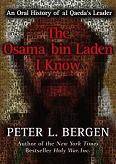
Daily Times, April 2, 2006
Al Qaeda wants to radicalise Western governments
By Khalid Hasan
WASHINGTON: It is Al Qaeda policy to stage terrorist incidents in the West so that Western governments turn on Muslims, which will eventually radicalise the latter, bringing them on the same ideological wavelength as the organisation that Osama Bin Laden heads.
Anatol Lieven, a former British journalist and now a resident scholar at a leading local think tank, speaking at an event at the Johns Hopkins University to launch Peter Bergen’s new book on Osama Bin Laden, said Al Qaeda “colonised” Afghanistan, taking advantage of the simplicity and naivety of the Taliban and their leadership, which was “deeply deferential” towards someone who hailed from Saudi Arabia, the heartland of Islam, and who also was wealthy. He said it should be remembered that the Soviet Union left Afghanistan not because it was “driven out” but because it was “worn out”. He said most Muslims, including Arabs, do not support the Al Qaeda philosophy or agenda.
Lieven said alienated European Muslims, with their large population, are a danger to the United States. If the millions of Muslims who live in Europe become radicalised and democratic freedoms keep shrinking, that being the Al Qaeda objective, this large body of disaffected men would be a source of danger and instability to the West and the terrorist threat would become much worse than it is today. It is Al Qaeda’s strategy to keep hitting Western governments and societies so that they become radicalised and intolerant of Muslims, which, in turn, will pull Muslims into the Al Qaeda ideological net. This is the “spiral” that Al Qaeda wants Western Europe to get into, he added.
Bergen, terrorism expert at CNN and an adjunct professor at Johns Hopkins, spoke about his new and well-reviewed book. Both he and Lieven answered questions from the audience, which included many students. Asked if Bin Laden would ever be caught, Bergen replied that the law of averages says he will be caught. At some point, he will make a fatal mistake. He said Bin Laden is not interested in cultural issues such as how Muslim communities living in the West should conduct themselves or if women should wear the hijab. He has a more nebulous agenda. He said the fact is that most people Al Qaeda is killing are Muslims and that has turned the Muslim populations at large against the group and its tactics and philosophy. He said Bin Laden is committing crimes against Islam and it is time for Muslim clerics to speak up against this.
Replying to a question, Bergen agreed that Al Qaeda is now a much weaker organisation and has taken a big hit after 9/11. The future of Al Qaeda, he stressed, does not lie in Pakistani madrassas but in Europe, where, he added, European governments are doing a poor job of integrating Muslims into society. Lieven, answering another question, said that the real war against radical Islam has to be fought by Muslims within the larger Islamic community and body politic.
Bergen said the mistake that Osama Bin Laden made was to assume that the United States was a “paper tiger” and would not react to an attack in the way it did. He added that the invasion of Iraq had re-energised Al Qaeda. Terrorist attacks in 2004 had doubled compared with the year before and 2005 would also show a worsening trend. He said finding Osama Bin Laden would be a great psychological victory. He pointed out that since 9/11, Bin Laden and his deputy Ayman al-Zawahiri have made and distributed 35 tapes, some of them containing instructions to Al Qaeda followers. He spoke in some detail about Bin Laden the person and how he was a loner and deeply religious right from his boyhood. At Jeddah University, he enlisted himself in a class to hear the lectures of Muhammad Qutb, brother of Sayyed Qutb. He was also “dazzled” by Abdullah Azam, with whom he later was to fall out. Bin Laden was always anti-America and was known not even to drink American soft beverages. The turning point for Bin Laden came in 1990 when American troops arrived on Saudi Arabian soil. Two days later, two American embassies were blown up in East Africa by Bin Laden’s people. It is not clear, he added, if Bin Laden had a hand in what happened in Somalia later. There was a debate raging within the ranks of the Taliban, he said, as to what to do with Bin Laden. It was Mullah Omar who did not agree to Bin Laden being handed over to the United States.
No comments:
Post a Comment